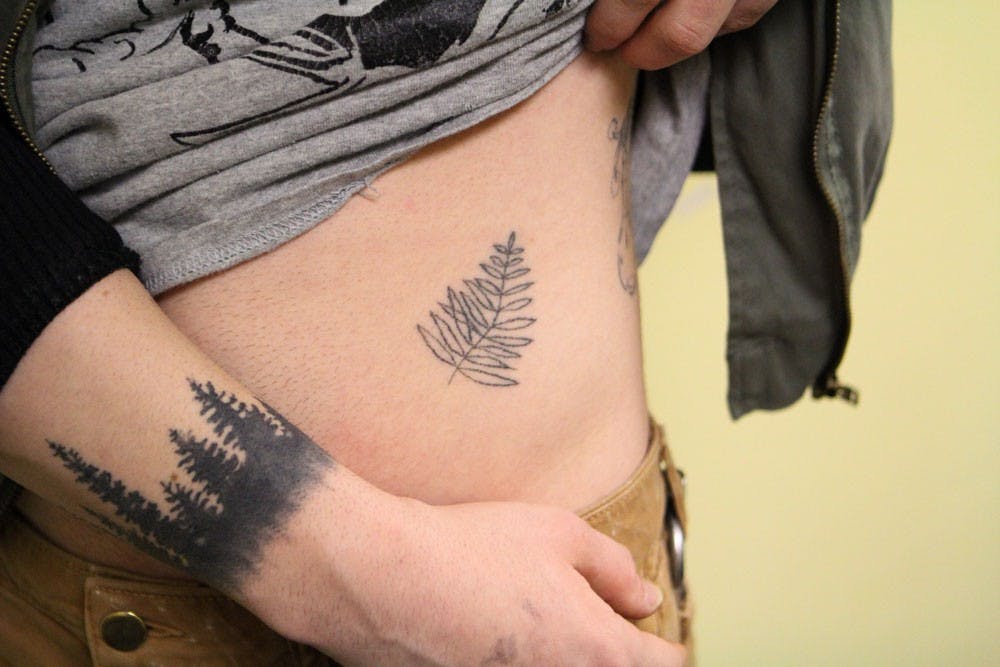Jess Trainor would rather not work than work a job that made her hide her tattoos.
Trainor, a junior health and human services major, has a tattoo on each arm, a quote across her back and plans to get a new one each year. She currently works with autistic children and hopes to work someday as a children’s social worker.
Trainor doesn’t think she should have to conform to a corporate work policy in order to have a job she enjoys. And she is not alone – nearly half of millennials have at least one tattoo, according to a 2015 survey from The Harris Poll. Tattoos are gaining acceptance in the workplace, but “highly visible” tattoos can still have a negative impact, especially in jobs requiring customer relations.
“So far, I haven’t worked anywhere where they care [about my tattoos]” Trainor said. “I worked in an office at UB last year with pink and green hair and no one even said anything to me about it.”
Jenna Smith, the coordinator of assessment and marketing of Career Services, recommends hiding tattoos for interviews ,but stressed that dress codes can vary depending on the industry and desired image.
“Do research on the company, understand the culture and connect with people who work there,” Smith said. “Be professional until you find out the attitude in the workplace.”
Kaia Grosso has nine tattoos, multi-colored hair and facial piercings, but isn’t concerned about how it will affect their future.
“I really just like the idea of destigmatizing the idea of body modifications in the workplace,” Grosso said. “It doesn’t make anyone less professional in my opinion, it’s all about the work and ethic you have.”
Grosso, a senior environmental geoscience major, identifies as gender neutral and got their first tattoo of a sound amp on their chest, which was inspired by album artwork they like. They also have tattoos across their toes, with plans to continue to cover their body.
In addition to tattoos, they have a multitude of piercings, including ear piercings, gauges and a septum piercing.
“I’m definitely, once I have money, planning on getting ‘tatted’ everywhere,” Grosso said. “I’m planning on doing lots of field research and stuff like that, so it won’t really be a big office setting. Even so, a lot of these piercings are easy to take out or hide [if necessary].”
Although the tattoos are in concealable locations, the ink is art that shouldn’t be covered, Grosso said.
M&T Bank’s corporate headquarters are in Buffalo and nearly 700 UB alumni work there, according to LinkedIn. The company has no corporate policy regarding tattoos.
“There is no corporate policy as long as the employee dresses and acts in a professional manner,” a human resources representative said.
Grace Zabielski, a sophomore environmental design and art major, has been dying her hair since she was 16. She works at Starbucks in The Commons and receives compliments on her purple hair or wrist tattoo, but has found that she can be perceived differently because of it.
“I feel like some people think I look like a rebel, I feel like it’s fun and some people automatically assume things about people with crazy hair and lots of piercings and I don’t think they should,” Zabielski said.
She was excited when Starbucks changed their policies for dyed hair last summer, but knows her unique hairstyles have an expiration date. Zabielski intends on dying it to either her natural color or a more natural shade for professional jobs to prevent any misconceptions about her work ethic.
“I don't know if I would go into a job with colored hair, because I feel like that automatically presumes the idea of maybe not being a stable person,” Zabielski said.
Despite the stigma, Smith mentioned that body modifications are more acceptable if they are incorporated into your “personal brand,” or how an applicant chooses to portray themselves to potential employers.
“[Employers] are more inclined to be accepting of a tattoo if there’s a reason it connects to the person you’re hiring,” Smith said.
She explained that these “personal brand” tattoos could even give students an edge, since it makes them unique and provides the employer with insight into personal depth.
Lindsay Gilder is the assistant features editor and can be reached at lindsay.gilder@ubspectrum.com





